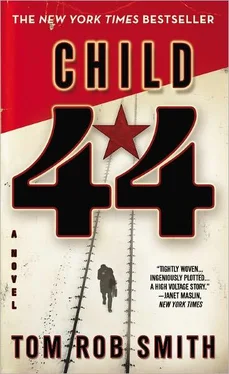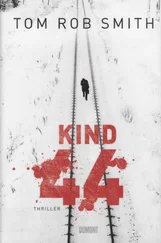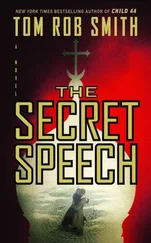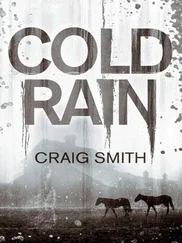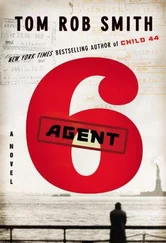Leo stood up, Raisa beside him. He turned to the director.
— Could we have a moment alone?
The director didn’t like the request. But he obliged and retired, shutting the door. Both girls positioned themselves with their backs against the door as far away from them as possible.
— Zoya, Elena, my name is Leo. Do you remember me?
No response, no change in their expression. Their eyes were alert, waiting for danger. Zoya took hold of her little sister’s hand.
— This is my wife Raisa. She’s a teacher.
— Hello, Zoya. Hello, Elena. Why don’t you both take a seat? It’s much more comfortable sitting down.
Leo picked up the chairs, putting them down near the girls. Although reluctant to move from the door, they sat down, still holding hands, still saying nothing.
Leo and Raisa crouched so that they were below the children’s eye level, still keeping their distance. The girls’ fingernails were black — perfect lines of grime — but their hands were otherwise clean. It was obvious that they’d been hastily tidied up before the meeting. Leo began.
— My wife and I want to offer you a home, our home.
— Leo has explained to me the reason you’re here. I’m sorry if this is upsetting to talk about, but it’s important we say these things now.
— Although I tried to stop the murder of your mother and your father, I failed. Maybe you see no difference between me and the officer who committed that terrible crime. But I promise you, I am different.
Leo faltered. He took a second, regaining his composure:
— You might feel that by living with us you’re being disloyal to your parents. But I believe your parents would want the best for you. And life in these orphanages will offer you nothing. After four months I’m sure you understand that better than anyone.
Raisa continued:
— This is a difficult decision we’re asking you to make. You’re both very young. Unfortunately we live in a time when children are forced to make adult decisions. If you stay here your lives will be tough and they’re unlikely to get any easier.
— My wife and I want to offer you back your childhood, we want to offer you a chance to enjoy being young. We won’t take the place of your parents. No one can replace them. We’ll be your guardians. We’ll look after you, feed you and give you a home.
Raisa smiled, adding:
— We expect nothing in return. You don’t have to love us: you don’t even have to like us necessarily, although we hope, eventually, you will. You can use us to get out of here.
Supposing the girls wanted to say no, Leo added:
— If you say no, we’ll try and find another family that will take you, a family that doesn’t have connections to your past. If that would be easier for you, you can tell us. The truth is, I cannot fix what happened. However, we can offer you a better future. We do not expect anything in return. You will have each other. You will have your own room. But you will always know me as the man who came to your farm, the man who came to arrest your father. Perhaps that memory will grow smaller over time, but you’ll never forget it. That will make our relationship complicated. But I believe, from personal experience, that it can work.
The girls sat in silence, staring at the Leo, staring at Raisa. They’d made no reaction and they hadn’t changed position, still sitting on the chairs holding hands. Raisa remarked:
— You are free to say yes or no. You can ask us to find you a different family. It’s entirely up to you.
Leo stood up.
— My wife and I will go for a walk. We’ll let you talk about it, the two of you, alone. You’ll have this room to yourself. Make whatever decision you like. You have no reason to be afraid.
Leo walked around the girls and opened the door. Raisa stood up and stepped out into the hallway, Leo followed, shutting the door behind them. Together they walked down the corridor, as nervous as they’d ever been in their lives.
Back in the office, Zoya gave her little sister a hug.
I’ve been lucky to have the support of a wonderful agent, St John Donald at PFD, who nudged me towards writing this book. For that nudge — and many other things beside — I’m extremely grateful. Thanks also to Georgina Lewis and Alice Dunne for their help along the way. Through the various drafts I had feedback from Sarah Ballard, which was the perfect mix of criticism and encouragement. Finally — and it’s clear I owe a lot to PFD — I’d like to thank James Gill for taking on the book once it was finished, only for him to tell me it wasn’t finished at all, making me rewrite it again. His enthusiasm at that stage was much needed and much appreciated.
My editors, Suzanne Baboneau at Simon Schuster UK and Mitch Hoffman at Grand Central Publishing, have been amazing. I’ve loved working with both of them. Thanks also to Jessica Craig, Jim Rutman and Natalina Sanina. Natalina was kind enough to point out some of the errors I made with regards to Russian names and Russian life in general.
Special mention must go to Bob Bookman at CAA for all his advice and for putting me in contact with Robert Towne. A writing hero of mine, Robert took time to share his thoughts with me on a late draft of the book. Needless to say, they were inspirational.
Outside of the professional sphere, I’ve had a handful of great readers. Zoe Trodd helped me enormously. Alexandra Arlango and her mother Elizabeth read numerous incarnations of the novel and at each stage offered detailed and invaluable comments. I cannot thank them enough. As it happens, Alexandra, through Qwerty Films — working with Michael Kuhn, Emmeline Yang and Colleen Woodcock — gave me my first break at writing. And it was while researching a screenplay I was writing for them that I stumbled across the real life case of Andrei Chikatilo and the events around it.
Many people assisted with the completion of this book but none more so than Ben Stephenson. I’ve never been as happy as I have been during these past few years.
Further reading
There would have been no way to write this story without having first read the memoirs, diaries and histories of a number of authors. I’ve enjoyed the research as much as writing and the body of work on the subjects touched upon in this book is of an awesome quality. What follows is a small selection of these works. I should point out that any liberties with the truth or historical inaccuracies in my novel are purely my own doing.
Janusz Bardach’s memoir Man is Wolf to Man (co-written by Kathleen Gleeson, Scribner 2003) offers a powerful portrait of trying to survive in the Gulags of Stalinist Russia. On that subject both Anne Applebaum’s Gulag (Penguin 2004) and Aleksandr Solzhenitsyn The Gulag Archipelago (Harvil 2003) have been essential reading.
For general historical background I’ve found Robert Conquest’s The Harvest of Sorrow (Pimlico 2002), Simon Sebag Montefiore’s Stalin (Phoenix 2004) and Shelia Fitzpatrick’s Everyday Stalinism (Oxford University Press 1999) extremely useful.
With regards to Russian police procedure, Anthony Olcott’s Russian Pulp (Rowman Littlefield 2001) went into detail not only about the justice system itself but also literary representations of that system. Boris Levytsky’s The Uses of Terror (Coward, McCann Geoghergan Inc. 1972) was invaluable when it came to understanding, or at least trying to, the machinations of the MGB. Finally, Robert Cullen’s The Killer Department (Orion 1993) provided a clear account of the real-life investigation into the crimes of Andrei Chikatilo.
Читать дальше
